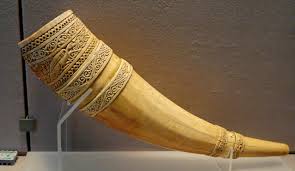ivory
英 [ˈaɪ.vər.i]
美 [ˈaɪ.vɚ.i]
- n. 象牙;乳白色;长牙
- adj. 乳白色的;象牙制的
- n. (Ivory)人名;(英)艾沃里
使用频率:

记忆方法
将“ivory”与“iv”联系起来,想象“iv”是一个象征性的数字“1”和“v”(罗马数字的“5”)的缩写,暗示着它的价值类似于“1+5”这一数额,象征高贵和珍贵,就如同象牙通常在历史上被视为非常珍贵。同时,将“ivory”的发音与“I voted for you”进行视觉和语音联想,意味着“我为你投票”,这里的“你”可以代表“ivory”,这样有助于记忆这个单词的含义和发音。
以上内容由AI生成, 仅供参考和借鉴
中文词源
ivory 象牙
来自拉丁语ebur,象牙。
英语词源
- ivory
-
ivory: [13] As is hardly surprising, ivory goes back ultimately to an African word which meant both ‘ivory’ and ‘elephant’. A likely candidate as this source is Egyptian āb, which may well lie behind Latin ebur ‘ivory’. This passed into English via Old French ivurie. The expression ivory tower ‘place where reality is evaded’ is a translation of French tour d’ivoire. This was originally used in 1837 by the French critic Sainte-Beuve with reference to the poet Alfred de Vigny, whom he accused of excessive aloofness from the practicalities of the world. The English version is first recorded in 1911.
- ivory (n.)
- mid-13c. (late 12c. as a surname), Anglo-French ivorie, from Old North French ivurie (12c.), from Latin eboreus "of ivory," from ebur (genitive eboris) "ivory," probably via Phoenician from an African source (compare Egyptian ab "elephant," Coptic ebu "ivory"). Replaced Old English elpendban, literally "elephant bone." Applied in slang to articles made from it, such as dice (1830) and piano keys (1854). As a color, especially in reference to human skin, it is attested from 1580s. Ivories as slang for "teeth" dates from 1782. Related: Ivoried.
权威例句
- 1. He showed him how to blow into the ivory mouthpiece.
- 他给他演示如何吹奏象牙吹口乐器。
- 2. The Ivory Coast became the world's leading cocoa producer.
- 象牙海岸成为世界上可可粉的主要产地。
- 3. The rebels have opened the road from Monrovia to the Ivory Coast.
- 叛乱分子已经开放了从蒙罗维亚到象牙海岸的道路。
- 4. a ban on the ivory trade
- 象牙贸易禁令
- 5. academics living in ivory towers
- 生活在象牙塔中的学者